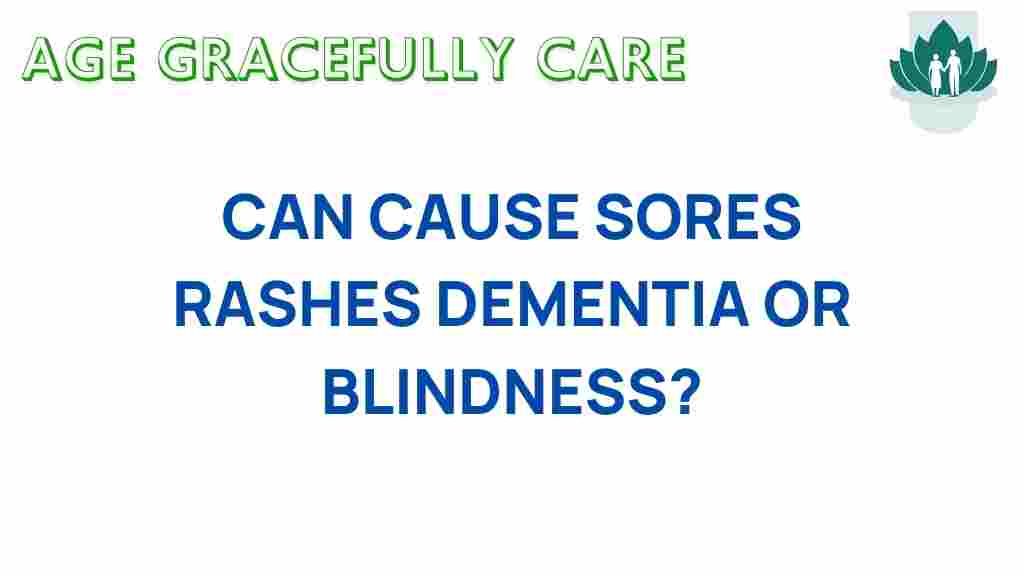Unraveling the Mystery: What Can Cause Sores, Rashes, Dementia, or Blindness?
When it comes to our health, the human body can sometimes present us with puzzling symptoms such as sores, rashes, dementia, and blindness. These conditions can arise from various underlying medical issues, and understanding them is crucial for effective diagnosis and treatment. In this article, we will explore the potential causes of these symptoms, their health risks, and what steps can be taken for proper diagnosis and management.
Understanding the Symptoms
Before diving into the causes, let’s take a look at the symptoms in detail:
- Sores: Open wounds or lesions that can occur on the skin or mucous membranes.
- Rashes: Changes in skin color or texture, often red, itchy, or inflamed.
- Dementia: A decline in cognitive function, affecting memory, thinking, and social abilities.
- Blindness: The loss of vision that can be partial or complete.
These symptoms can often interconnect, leading to a complex web of health risks that may require careful consideration and medical intervention.
Potential Causes of Sores, Rashes, Dementia, and Blindness
There are numerous medical conditions that can lead to these symptoms, each with its unique health risks and implications. Below are some common causes:
- Infections: Bacterial, viral, or fungal infections can lead to sores and rashes. For example, herpes simplex virus can cause sores, while chickenpox can lead to rashes.
- Autoimmune Disorders: Conditions like lupus or psoriasis can manifest as rashes and sores. These disorders occur when the immune system mistakenly attacks healthy cells.
- Neurological Disorders: Dementia can be caused by Alzheimer’s disease, vascular issues, or other neurological conditions. Symptoms range from memory loss to impaired reasoning.
- Ocular Conditions: Diseases such as glaucoma or diabetic retinopathy can lead to blindness. These conditions often develop silently and require regular eye examinations for early detection.
- Allergic Reactions: Allergies can cause rashes and sores. Contact dermatitis, for instance, occurs when the skin reacts to an allergen.
- Chronic Diseases: Diabetes can lead to both skin issues (like diabetic dermopathy) and serious complications, including blindness.
Health Risks Associated with These Symptoms
Each of these symptoms carries potential health risks:
- Infections: If left untreated, infections can spread and lead to serious complications, including sepsis.
- Autoimmune Disorders: These can cause chronic pain and organ damage, significantly affecting quality of life.
- Dementia: This can lead to a decline in daily functioning, increased dependency on caregivers, and a higher risk of other health issues.
- Blindness: Loss of vision can lead to falls, decreased quality of life, and mental health issues like depression.
Recognizing these symptoms early can be critical in preventing further complications.
Diagnosis of Sores, Rashes, Dementia, and Blindness
Proper diagnosis is key to managing any health condition. Here are the steps typically involved:
- Medical History: The doctor will ask about your symptoms, medical history, and any medications you are currently taking.
- Physical Examination: A thorough examination will help determine the nature of the sores or rashes, and assess cognitive function for dementia.
- Laboratory Tests: Blood tests, skin biopsies, or imaging studies (like MRIs for dementia) may be ordered to identify underlying causes.
- Referral to Specialists: Depending on initial findings, a referral to a dermatologist, neurologist, or ophthalmologist may be necessary.
Timely diagnosis can lead to better outcomes, making it essential to seek medical advice when experiencing these symptoms.
Troubleshooting Tips for Managing Symptoms
If you or someone you know is experiencing sores, rashes, dementia, or blindness, here are some troubleshooting tips:
- Keep a Symptom Diary: Track when symptoms occur, their duration, and any potential triggers.
- Maintain Good Hygiene: Proper skin care can prevent infections and manage rashes effectively.
- Stay Informed: Research your symptoms and conditions, but ensure you rely on reputable sources.
- Engage in Cognitive Activities: For dementia, activities that stimulate the brain, like puzzles or reading, can be beneficial.
- Consult Healthcare Professionals: Don’t hesitate to reach out for medical advice or support.
By taking these proactive steps, you can potentially manage symptoms more effectively and improve overall health.
When to Seek Medical Attention
Some situations warrant immediate medical attention:
- Severe Symptoms: If you experience severe pain, prolonged symptoms, or major changes in vision or cognition.
- Signs of Infection: Symptoms such as fever, increased redness, or swelling around sores or rashes.
- Changes in Behavior: Noticeable changes in mental status or behavior can indicate a medical emergency.
It’s always better to err on the side of caution when it comes to health concerns.
Conclusion
In conclusion, understanding the potential causes and health risks associated with sores, rashes, dementia, and blindness is crucial for effective management and treatment. Early diagnosis can significantly improve outcomes, so staying vigilant and seeking medical advice when necessary is essential. If you want to delve deeper into related health topics, consider visiting this resource for more information.
Remember, your health is your most valuable asset; take the time to care for it wisely.
This article is in the category Health and created by AgeGracefullyCare Team
